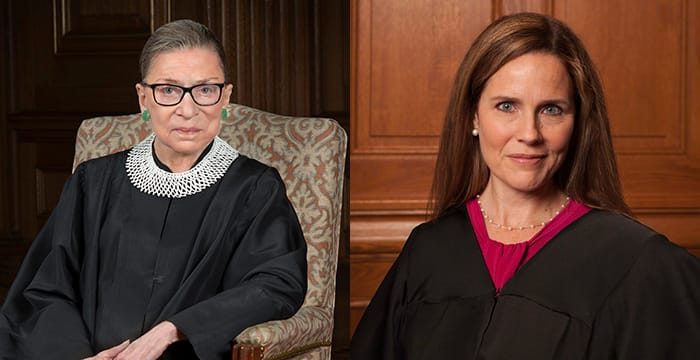Politically-charged process kicks off today

Today, in a live broadcast, is the first day of perhaps the most intense job interview in legal when a 22-member Senate Judiciary Committee interrogates Judge Amy Coney Barrett, selected by Donald Trump to fill the seat at the US Supreme Court left vacant after the death of Ruth Bader Ginsburg.
The stakes are high on Judge Barrett’s appointment: liberal Americans fear their top court, with already five conservatives to four liberals, will swing even further towards the Republicans with a six-three majority once Barrett, described by the American media as “uniformly conservative”, is on-boarded.
This matters on issues such as abortion, health care, the role of religion in schools. But there will also be decisions more up close and personal such as President Trump’s tax returns and the problem of whether they should be handed over to prosecutors; and if there were to be any challenges in the voting procedures of the imminent presidential election, those cases would almost certainly end up in the Supreme Court.
No wonder then that the nomination is politically charged.
Part and parcel of the appointment process for the top spots in the US judicial hierarchy, these confirmation hearings have become notoriously hostile and partisan. As recently as 2018, at the hearing of now Associate Justice Brett Kavanaugh, the world was transfixed by the gripping witness evidence of allegations of sexual assault from Christine Blasey Ford followed by Kavanaugh’s defence.
Judge Barrett will have been hard at work preparing for the hearing ordeal with what are quaintly known as ‘murder boards’ where advisers will have fired questions at her during numerous practice sessions on matters of law and policy. She has already had to submit a CV that sets out almost every judicial decision she has ever made (and a justification for it) — Kavanaugh’s CV was 110 pages long.
The US system is much more high profile than here in the UK partly because power rests with the President himself to put forward a name. This is true not only of the Supreme Court but also of appeal and district courts. (Indeed, Trump has made it a goal to nominate as many judges at every level as he can — the current tally is 217, according to the Brookings Institution). The partisanship starts much further down the judicial supply chain.
In the UK, there is a less prominent connection between law and politics with a separate selection commission for Supreme Court appointments, and a Judicial Appointments Committee (JAC) for other judges. The people who selected the most recent judge to join the Supreme Court, Lord Stephens, were: the current president of the Court, the Lord Chief Justice of Northern Ireland and three non-lawyer members of the JAC.
And the tenure here in the UK has a cut-off retirement age of 70, whereas in the US it is a lifetime appointment. So once they are in, that’s it for a generation. Barrett is 48 which means she could be a serving supremo judge for almost the same period of time again.
The US court is also more high profile because it plays a far more overt role in interpreting laws in the light of the country’s written constitution. Though not everyone agrees that the UK system keeps law and politics apart as much as we like to think. Legal commentator and solicitor, David Allen Green, recently wrote in his Financial Times column (£): “Judges are often in effect lawmakers and policymakers, though they cloak it as ‘developing’ existing law.”
Judge Barrett’s nomination has been controversial from the very start for being pushed through before the presidential election on 3 November: when a vacancy came up during the election year for Barack Obama, there was a furore from the Republican ranks and the nomination process was postponed.
This week’s confirmation hearings will see hostile Democrats seek out chinks in Barrett’s armour, such as her religious views, that could undermine her nomination. They may deliberately quiz her on the most significant legal issues of the day but she will try her best not to answer or commit on those issues because if she does then she could be debarred from deciding those cases if they come before the court in the future. This piece of political theatre is how the hearings earned the description a ‘Kabuki dance’ by Joe Biden, current Democrat presidential candidate.
The show goes live today from 9am US time/2pm UK time in Washington DC. You can watch the confirmation hearings here.


